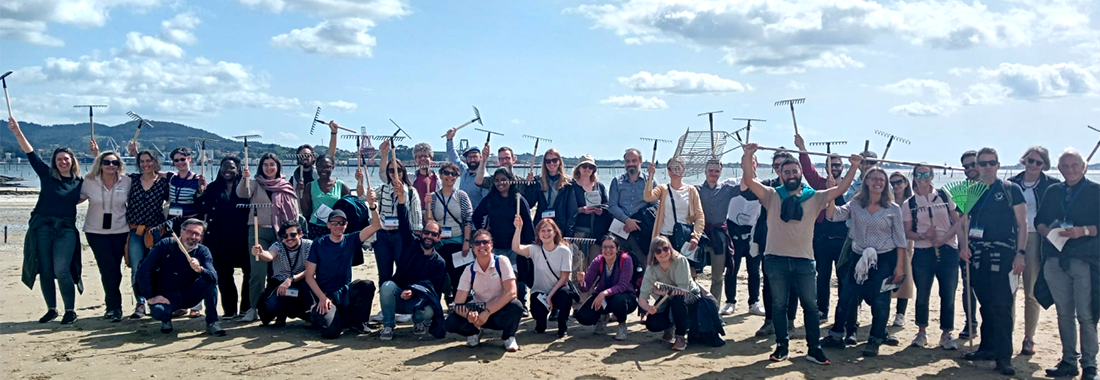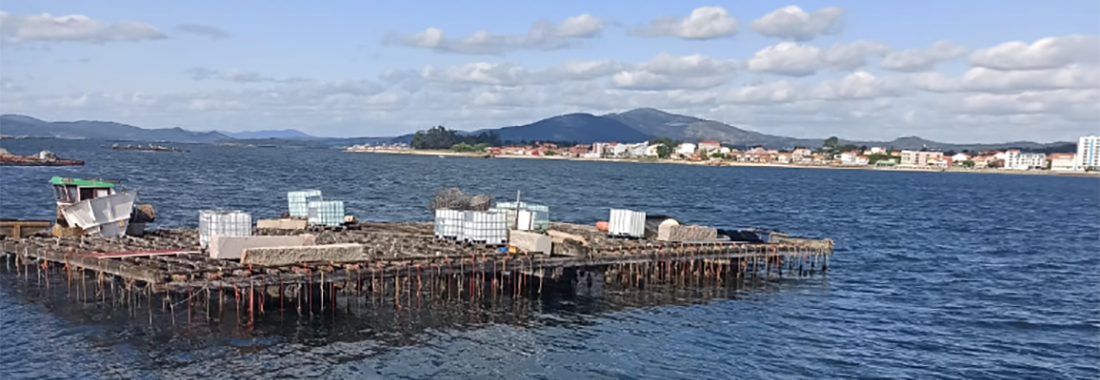TransformAr recently stopped off in Santiago de Compostela in Galicia, Spain, for the 4th Meeting of the Consortium of the Horizon H2020 project which studies essential solutions and paths for climate and social resilience, starting right from activities at sea. The meeting, hosted by the partners FEUGA and CETMAR was an opportunity to evaluate the progress of the activities, foresee the next steps and forge new collaborations.
Together with our international partners, we took stock of the project's activities, now in its second year, but we also discussed local shellfish production and political and regional climate adaptation strategies. TranformAR aims to develop solutions and models to achieve rapid, 'transformative' and far-reaching climate change adaptation across Europe.
The Galician region, with a population of 2.7 million, has developed a Galician climate change strategy 2050 and an integrated regional plan for energy and climate for the period 2019-2023 which aims to guide the strategy implementation. The aquaculture sector directly employs nearly 4,000 people in the region, of which 90% are self-employed women.
Guests of the AmarCarril - Turismo Marinero Inclusive association operating in Carril (Vilagarcía de Arousa) which deals with the cultivation and extraction of shellfish also through educational workshops for schools and workshops, we visited a local clam farm. In addition to learning about the different breeding techniques, we discussed the difficulties in the sector in relation to the effects of climate change.
Three solutions are being tested:
- Digital and technological solutions for intelligent management of mussel production is based on real-time monitoring of mussel rafts, by CETMAR.
- A strategic tool, "the Resilience Index" which will identify the most relevant priorities to better adapt mussel farming to climate change, by the University of Vigo.
- Among the solutions proposed for clam farming and artisanal shellfish fishing, the characterization and modelling of intertidal salt marshes (between high and low tide), and therefore provide the basis for adapting production, by of the University of Vigo
During the Galician days we visited the TransformAr pilot site where sensors are being tested to measure the effects of climatic variations and adapt mussel farming to climate change. This will improve knowledge on the response of sandbanks under the influence of climate change and thus provide the basis for adapting production.
Pics by AMARCARRIL and MEDSEA
Latest news

TransformAr Open Day in Marceddì: Marshes and Lagoons to Reimagine the Future
Natural Solutions to Adapt to Climate Change: Lagoons and Marshes. This topic was discussed during an immersive walk between the Marceddì Lagoon and the San Giovanni Marsh on Friday, July…

MEDSEA joined the Natural Heritage Interreg Euro-MED Mission in Rovinj for aligning in projects' Communication
MEDSEA stopped in Rovinj, Croatia, from June 26th to 27th, 2024, to participate in the Communication, Amplification and Policy activities of the Interreg Euro-MED Natural Heritage mission, which brings together the thematic projects…

DesirMED: Nature-Based Solutions for Climate Adaptation, Regional Comparison at the Mid-Year Assembl
The DesirMED project recently held its General Assembly online on June 19 and 20 to review the progress of activities in the first semester. This meeting saw the participation of all scientific partners and…

Waste Hunt at Sella del Diavolo to Protect our Cetaceans Friends
Last Saturday on June 15th, nearly a ton of waste was recovered both on land and at sea during the "Puliamo la Sella!" event in Cagliari. The collected items included…

Active Restoration of Posidonia oceanica: MEDSEA at the 2024 World Seagrass Conference in Naples
MEDSEA continues to lead in the active restoration of Posidonia oceanica, a crucial topic for the conservation of Mediterranean marine ecosystems. Recently, the guide "Guidelines for the Active Restoration of Posidonia oceanica"

TransformAr Open Day on July 5th 2024: Discovering Transformative Solutions for Climate Change at the Marceddì Lagoon
On July 5th, TransformAr presents itself to the public with a special Open Day. The European Horizon 2020 project, aimed at developing transformative solutions for climate change adaptation, invites curious minds and citizens…

Puliamo la Sella! 2024 dedicated to our cetacean friends, with WWF, returns to Cagliari on June 15, 2024
The coastal cleanup organized by the MEDSEA Foundation, Puliamo la Sella!, returns to Cagliari on June 15th 2024. This year's event, now in its sixth edition, will be a special…

Deep Dive: The Talk for World Oceans Day
World Oceans Day provided an opportunity to reaffirm the importance of acting now to protect one of our most precious assets: the marine and coastal ecosystem. The Coalitions of the…
First SEG Meeting of the BLUE4ALL Project: A Focus on Surveillance and Biodiversity Protection
On May 23, 2024, the inaugural SEG (Stakeholder Engagement Group) meeting for the BLUE4ALL Project was held at Casa Todde in Villasimius, with options for remote participation.

RICREA introduces itself in Lucca, working on updating the Contracts, and will also focus on the Blue Crab
River, lagoon, and water body contracts in general are an exceptional tool for sustainable and participative environmental management, essential for the protection of water resources and local biodiversity. However, there…

TransformAr: Climate Adaptation Pathways Finalized for the Fisheries and Agriculture Sector in Terralba
This week, a participatory workshop was held in Terralba as part of the TransformAr project to finalise the adaptation pathways developed with local operators, particularly in the fisheries, agriculture, and biodiversity sectors.

ARTEMIS, Partner Meeting in Marseille to Kick Off Activities
On May 15th and 16th, at the Plan Bleu headquarters in Marseille, the first in-person meeting of the ARTEMIS project was held since the kickoff in March. ARTEMIS is a project within the…

DEEP DIVE: The Alarming State of the Ocean – Inspiring Action and Searching for Solutions (Webinar)
In celebration of World Ocean Day, MEDSEA invites you to the online event "Deep Dive: The Alarming State of the Ocean", a detailed analysis of the challenges that oceans are…

Fire Monitoring Test successfully conducted in Santu Lussurgiu thanks to IoT Technologies
At the end of April, a major breakthrough in fire prevention technology was achieved in the forests of San Leonardo. Thanks to pre-fire detection sensors, an IoT (Internet of Things) technology developed and…

REST COAST, at the annual meeting in Groningen, demonstrates the effectiveness of natural restoration of aquatic systems
The standstill of the Nature Restoration Law, the European law on nature restoration, stalled in its final approval phase in the Council due to the hesitations of some Member States, has…

TransformAr makes a stop in Finland for the sixth Consortium Meeting
In mid-April, the sixth Consortium meeting of the H2020 TransformAr Project was held in Lappeenranta, recognized as the Climate Capital of Finland. This city truly exemplifies sustainability, with 100% of waste recycled and all…
- 1
- 2
- 3
- 4



